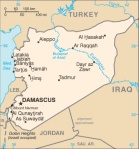 Of all the horrors occurring in Syria — more than 11,500 deaths, torture, displacement, the resurgence of infectious diseases — the outbreak of polio is a “war crime of truly epidemic proportions.”
Of all the horrors occurring in Syria — more than 11,500 deaths, torture, displacement, the resurgence of infectious diseases — the outbreak of polio is a “war crime of truly epidemic proportions.”
That’s the verdict of Dr. Annie Sparrow, a critical-care pediatrician and public health professional who is also assistant professor of global health and deputy director of the human rights program at Icahn School of Medicine at Mount Sinai in New York.
She writes about polio in Syria in the 20 February issue of the New York Review of Books.
Syria has not had an indigenous case of polio since 1995 — until last year, when 90 cases were documented. That outbreak is entirely man-made, Dr. Sparrow argues, because part of the government’s war strategy has been to target immunization programs, physicians and the health-care system generally.
“This politicizing of public health meant that many children born in 2010 or later could not commence or complete the routine course of polio vaccination required for effective protection,” Dr. Sparrow writes. “Of the roughly 1.8 million children born since the conflict began, more than half may be completely unvaccinated,” given WHO estimates that the vaccination rate has dropped from 83% of two-year-olds before the war to 52% in 2012.
Dr. Sparrow estimates that more than three million children across Syria may now be vulnerable, and some percentage of refugees in neighbouring countries must be carrying the virus.
“Ironically, Syria’s children are now at greater risk than children in the three countries where polio is still endemic (Afghanistan, Pakistan, and Nigeria) because they lack the natural immunity that comes from exposure and because the spread of polio by respiratory means is aggravated by the crowded conditions under which millions now live.”
But the Syrian health ministry has, until recently, refused to acknowledge the outbreak, let alone take steps to control it. While vaccines were sent in November to some “contested” areas, that effort was sabotaged by poor promotion, minimal record-keeping and lack of a cold chain, as well as completely missing “inaccessible” areas.
“The international community should stop pretending that mere vaccination is the answer.”
Dr. Sparrow prescribes immunization as one element of an “effective response” to the outbreak. But “the international community should stop pretending that mere vaccination is the answer,” she said, adding that improved nutrition, cleaning up the water supply, providing adequate treatment for children with polio and reducing overcrowding and other poor living conditions are required.
But it’s important to recognize that the Syrian government won’t provide those, nor will international assistance help if it needs to be channeled through Damascus. “WHO, UNICEF and other international agencies must be free to launch cross-border operations. But that will happen only if ordered by the UN Security Council,” Dr. Sparrow said.
The international community should also not accept “the Syrian government’s efforts to pretend to be doing something to address the humanitarian needs of civilians in opposition-held areas while continuing its deliberate strategy — which amounts to a war crime — of making life as miserable as possible for the people living there,” she said.
“Rather than diverting attention from the regime’s war on civilians, the global threat posed by this polio epidemic provides the imperative for ending it.” ~TM

Reblogged this on Murray's Review of Medical Journalism.